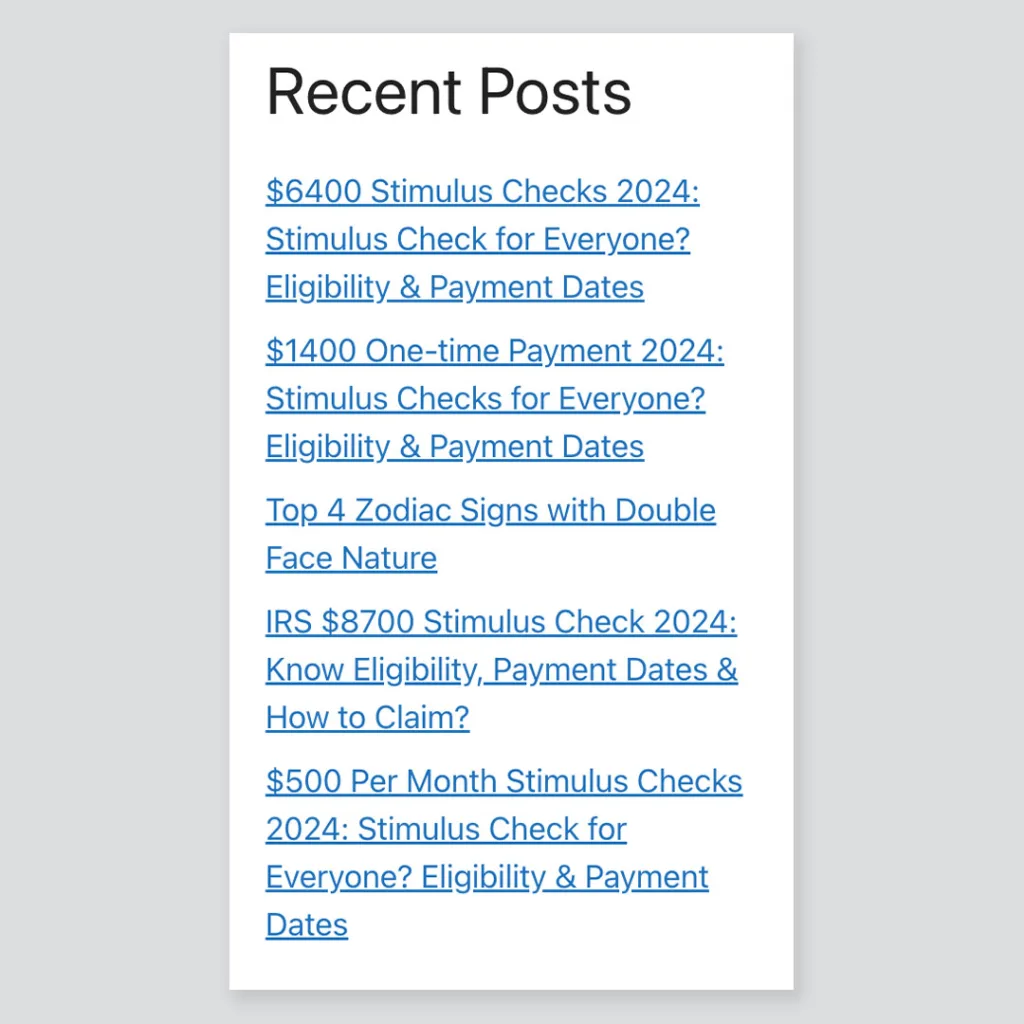Sketchy news websites are flooding the internet with bogus stories about stimulus checks and other government handouts in a growing scheme that has catapulted blatant misinformation to the top of Google’s trending search topics at least three times in the past two weeks.
The websites appear to be once-legitimate domains that have been rebranded for the sole purpose of producing click-baity stories on high-interest search terms, with little regard for truth or facts.
In one example, a website called RLPS.org posted no fewer than five stories about stimulus checks over a 24-hour period on Monday, claiming that eligible Americans can receive anywhere from $500 to $8,700. Last month, the site claimed that residents of California could receive a stimulus check for $12,000.
None of the stories are true: As Fast Company reported last week, the COVID-era stimulus payments distributed by the Internal Revenue Service (IRS) ended in 2021 and California has no plans for future stimulus.
After Fast Company contacted RLPS for comment, some of its stories were removed or updated. In an emailed response, the site said, “We will fact-check those stories and delete them as soon as possible.”
Old domains, new mission
RLPS describes itself as a “finance news portal,” although its About Us page is riddled with typos. An Internet Archive search reveals that the domain once belonged to the Rani Laxmibai Group of Public Schools in India and dates back to 2005. The domain’s current owner is private and the site did not respond to questions about its ownership.
Clik here to view.

Interestingly, the archive shows no captures of the domain between January and March of this year, indicating that whoever repurposed the site did so relatively recently, which would explain the recent firehose of falsehoods.
It’s a similar story on Sassy by Savannah, a website that once featured beauty products in connection with reality TV personality Savannah Chrisley but now mainly surfaces inaccurate reports about stimulus checks and other finance news under the banner “Sass News.” An archive search shows that the website generated no captures in 2024 until April, when activity started ramping up again. A note on the website says it is “not owned by Savannah Chrisley anymore.”
A rep for Chrisley did not reply to a request for comment. Fast Company also reached out to the website via the contact email but did not receive a response.
In yet another example, the front page of AzedNews—formerly home to Arizona-specific stories about education—now serves up a steady stream of headlines about stimulus checks.
The twist? This site is apparently debunking the stimulus-check stories posted by the other sites. You have to dig pretty deep into each article about stimulus checks to find the information that actually does the debunking, and fair warning: It might make you a little dizzy.
Fast Company also contacted AzedNews to ask about its ownership and mission. A note at the bottom of the site says it is “no more [sic] associated with the previous owners.”
Clik here to view.

Who is behind these weird sites?
It’s unclear who or how many people are behind these schemes or why these specific domains were chosen. There are many more examples, and many of the sites follow a similar format.
Some of the sites use questionable bylines and bio photos that image searches reveal belong to other writers. One writer we contacted via LinkedIn said she was “shocked” to discover her photo on Sassy by Savannah.
One possibility is that the schemers thought they could gain an advantage in Google’s search rankings by taking control of expired or dormant domains, especially ones with a robust history of content.
And they weren’t wrong—both RLPS and AzedNews are indexed by Google News, the search giant’s tab for legitimate news outlets, meaning the false stimulus-check reports have been appearing there as well. Stories that appear on Google News are subject to rigid content policies, including rules against deceptive behavior.
Fast Company reached out to Google for comment.
In addition to Google News, the articles are also being amplified by the featured snippets that Google prominently displays in search results. In one case, a snippet cited a report from Sassy by Savannah teasing a $600 increase for Social Security benefits to adjust for cost of living. In reality, the Social Security website explicitly says that such reports are false and that no increase will happen until next year.
Clik here to view.

The IRS routinely issues warnings about tax scams, especially those targeting seniors. In this case, the aim appears to be to generate traffic to the websites—not bilk specific taxpayers out of their money. All of the websites appear to be monetized by Google ads.
Clik here to view.

Whatever the case, they seem to be working as intended: The appearance of these topics in Google’s trending searches indicates that a good amount of search volume has been achieved, which is a shame. It means that a lot of unsuspecting people who could really use a stimulus check right now are likely falling for these false stories.